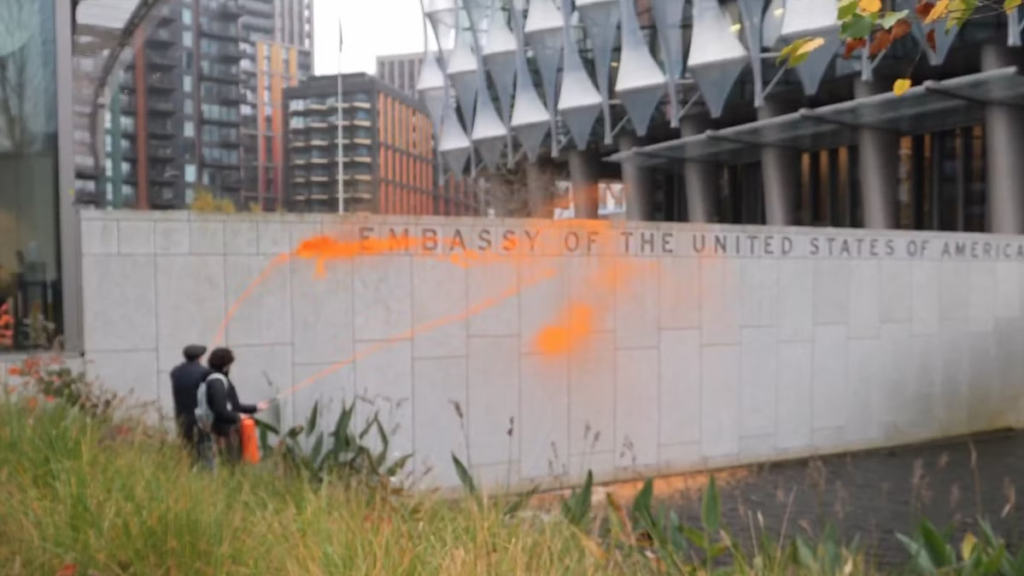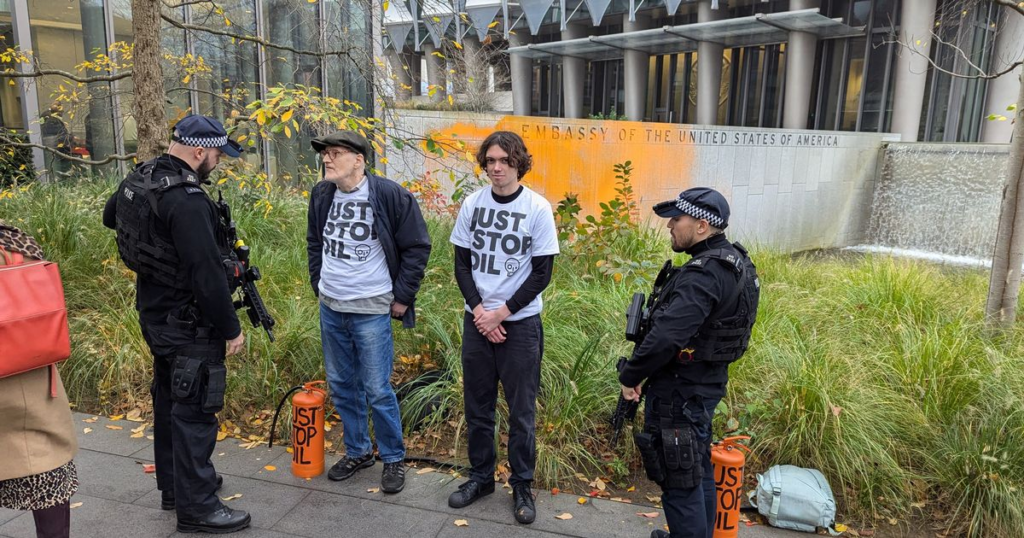In a swift and bold response to Donald Trump’s win in U.S. President, climate activists from the Just Stop Oil group sprayed a section of the U.S. Embassy in London with orange paint. This act of civil disobedience occurred on Wednesday, November 6, and was promptly captured and circulated on social media, sparking heated discussions about the boundaries between activism and vandalism.
The protest aimed to emphasize the group’s opposition to Trump’s climate policies and his perceived lack of action on climate change, which they believe poses a direct threat to global welfare. Two activists, aged 25 and 72, took part in the action, with British police arresting them shortly after the incident on charges of criminal damage.
The Controversial Protest by Just Stop Oil after Trump’s Win
Videos posted by Just Stop Oil show the bright orange paint splattered across the embassy wall, dripping onto nearby plants and even into the River Thames.
According to the group, this dramatic display was intended to symbolize the dangers they associate with Trump’s policies, which they claim endanger “the lives of ordinary people everywhere.”
Read : Donald John Trump Wins US Presidential Election 2024
As climate activists around the world become increasingly vocal, their disruptive methods are designed to draw attention to the urgency of the climate crisis, even if it means breaking the law.
Read : Ukraine Attacks North Korean Soldiers in Russia for the First Time
This protest exemplifies a broader trend of climate activism that is shifting towards more direct and visible methods in a bid to force governments and leaders to address climate concerns immediately.
The Message Behind the Protest
Just Stop Oil has become well-known across the United Kingdom for its striking protests. Their actions, while controversial, serve to amplify their central demand: an end to fossil fuel extraction by 2030. The group asserts that the continued extraction and burning of fossil fuels such as oil, gas, and coal are incompatible with a sustainable future.

According to Just Stop Oil, the re-election of Donald Trump signals an era of increased environmental deregulation and a continued commitment to fossil fuel dependency. They argue that Trump’s policies threaten the progress made on climate change and undermine efforts to transition towards renewable energy sources.
Through this protest, Just Stop Oil sought to send a clear message not only to the United States but also to the global community. In a press release following the incident, the group expressed concerns that Trump’s leadership could embolden other countries to slow their climate efforts.
They claimed that their protest at the U.S. Embassy was a “wake-up call” for citizens around the world to recognize the urgency of the climate crisis and to hold their leaders accountable. This tactic of targeting high-profile locations aims to bring maximum visibility to their cause, regardless of the legal consequences.
The group’s previous protests have included disrupting popular events and even spraying orange powder at Stonehenge. Just Stop Oil justifies these dramatic actions as necessary measures to disrupt daily life and compel people to confront the immediate threat of climate change.
By staging these disruptions, they hope to inspire broader public support for policies that phase out fossil fuels, reduce greenhouse gas emissions, and mitigate the effects of climate change.
Responses and Reactions to Just Stop Oil’s Protest
The protest at the U.S. Embassy has drawn a range of responses, highlighting the polarized views on climate activism. Supporters of Just Stop Oil argue that drastic measures are needed to combat climate inaction, especially in light of Trump’s victory, which they see as a step backward for global climate policy.
Many environmental advocates have applauded the group’s commitment to raising awareness, citing the urgent need for countries worldwide to accelerate their transition to renewable energy. They contend that climate activism must be loud and visible to counterbalance political inertia and corporate interests that perpetuate the fossil fuel industry.
Conversely, critics of Just Stop Oil’s tactics argue that such actions amount to vandalism and can undermine the legitimacy of the climate movement. British authorities responded quickly to the embassy incident, emphasizing a “zero tolerance” policy for vandalism disguised as protest.

Deputy Assistant Commissioner Andy Valentine commented that actions like this can be seen as detrimental to public safety and property. Critics also contend that disruptive protests may alienate potential allies and shift the focus away from constructive dialogue on climate solutions.
For some, the spray-painting of the U.S. Embassy crossed a line, overshadowing the broader climate message with an act that was seen as unnecessarily antagonistic.
The debate over Just Stop Oil’s protest reflects a broader division within the environmental movement itself. While many believe that visible, disruptive actions are essential to force political change, others advocate for more moderate approaches that engage policymakers and the public in constructive conversations.
Yet, as climate concerns grow more pressing and visible impacts like extreme weather events become more common, groups like Just Stop Oil are likely to continue pushing the boundaries of activism. Their protests, though divisive, underscore the desperation felt by many in the face of political inaction on climate change.

